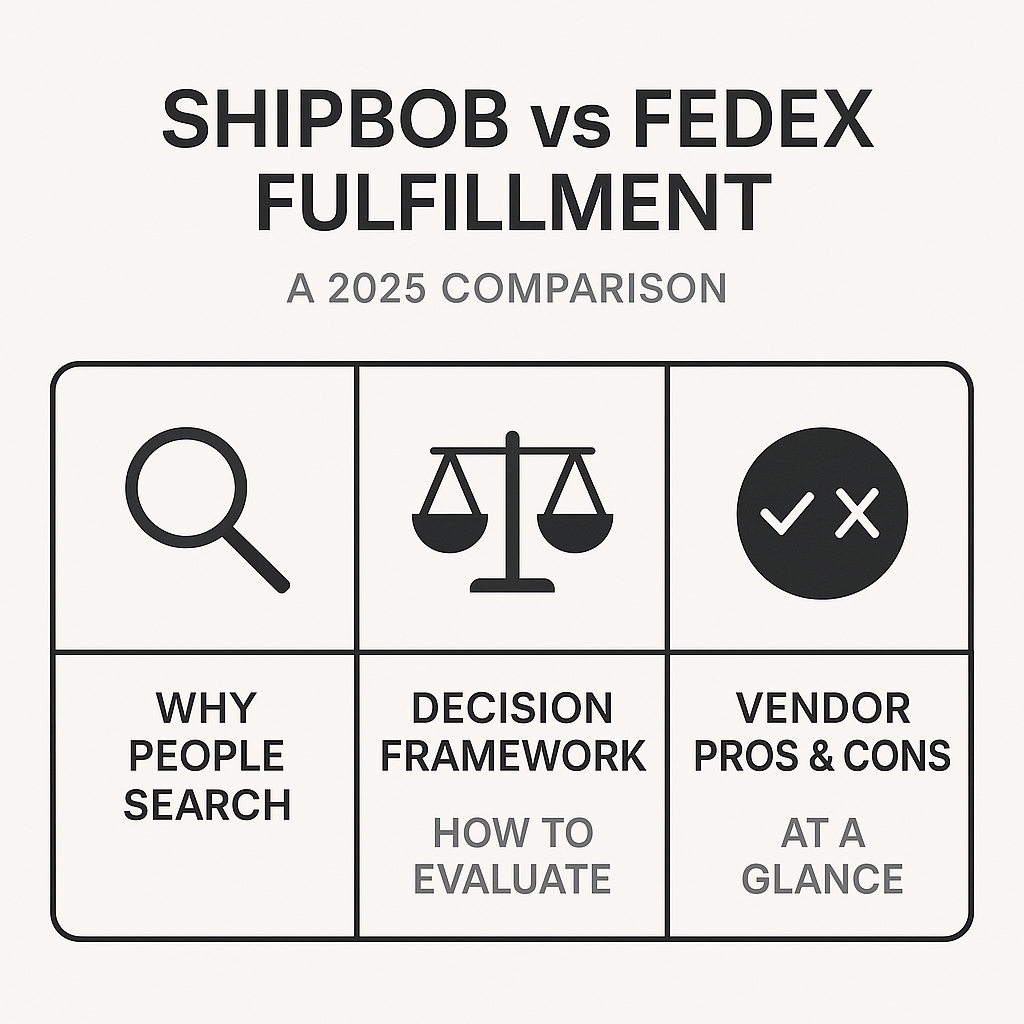
ShipBob vs FedEx Fulfillment
In the ever-evolving landscape of ecommerce logistics, choosing the right third-party logistics (3PL) provider can feel daunting. As we step into 2025, many businesses find themselves weighing the benefits of ShipBob vs FedEx Fulfillment. This article will help you navigate this decision by comparing these two giants head-to-head, highlighting their strengths, weaknesses, and the nuances that could impact your business.
Why People Search ‘shipbob vs fedex fulfillment’ in 2025
As ecommerce continues to grow, logistics managers and business founders are increasingly searching for reliable 3PL partners. In 2025, the decision between ShipBob and FedEx Fulfillment is driven by trends such as AI-driven forecasting, sustainability initiatives, and the need for rapid, reliable delivery. Both companies have adapted to these trends, but they offer different strengths that cater to specific business needs.
ShipBob is known for its tech-forward approach and seamless integration with ecommerce platforms, making it a favorite among startups and SMEs. FedEx Fulfillment, on the other hand, leverages its vast network and experience in global logistics, appealing to businesses looking for scale and reach.
- Consider how each provider’s technology stack aligns with your current systems.
- Evaluate the importance of sustainability initiatives in your logistics strategy.
- Assess the scalability of each solution in line with your growth projections.
Decision Framework: How to Evaluate
When evaluating ShipBob vs FedEx Fulfillment, it’s crucial to consider several factors that align with your business goals. These include cost, speed, reliability, and customer support. Each provider offers unique benefits that can significantly impact your operations.
Start by defining your primary logistics needs. Are you looking for a partner to enhance your delivery speed, or is cost reduction your priority? Understanding these needs will help you weigh the trade-offs between ShipBob’s tech-savvy solutions and FedEx’s extensive network.
- Map out your logistics priorities: speed, cost, reliability, or support.
- Consider the integration capabilities with your existing ecommerce platforms.
- Evaluate the potential for scalability and international expansion.
Vendor Pros & Cons at a Glance
- ShipBob Pros: Seamless ecommerce integration, advanced technology, flexible pricing.
- ShipBob Cons: Limited global reach compared to FedEx, potential higher costs for high-volume shipments.
- FedEx Fulfillment Pros: Extensive global network, reliable delivery times, strong brand recognition.
- FedEx Fulfillment Cons: Higher complexity in integration, less flexibility in pricing for smaller businesses.
ShipBob excels in technology and integration, making it ideal for tech-savvy businesses. However, FedEx’s global network offers unparalleled reach, which is crucial for businesses aiming for international markets.
Pricing & Total Landed Cost: What Really Moves the Number
Understanding the pricing structures of ShipBob and FedEx Fulfillment is essential for calculating your total landed cost. ShipBob typically offers more transparent and flexible pricing models, which can be advantageous for startups and SMEs. FedEx, with its vast network, might have higher baseline costs but offers economies of scale for larger shipments.
- ShipBob offers clear, upfront pricing with no hidden fees, beneficial for budgeting.
- FedEx provides volume discounts, which can lower costs for high-volume shippers.
- Consider the impact of shipping zones and surcharges on your overall costs.
While ShipBob’s pricing is straightforward, FedEx’s potential for discounts on larger volumes can be a deciding factor for businesses with significant shipping needs.
Feature-by-Feature Comparison
- Integration: ShipBob offers seamless integration with major ecommerce platforms; FedEx requires more complex setups.
- Network Reach: FedEx has a global presence; ShipBob is more regionally focused.
- Technology: ShipBob provides advanced analytics and real-time tracking; FedEx offers robust logistical support.
- Customer Support: ShipBob is known for responsive support; FedEx offers extensive resources but can be less personalized.
ShipBob’s strength lies in its technology and integration capabilities, making it a strong choice for ecommerce-focused businesses. FedEx’s extensive network and logistical expertise are ideal for companies with global ambitions.
Scenario Playbook: Who Should Choose What?
- Startups & SMEs: ShipBob’s flexible pricing and tech integration make it a great fit.
- Large Enterprises: FedEx’s global network and economies of scale are advantageous.
- Tech-Driven Businesses: ShipBob’s advanced analytics and ecommerce focus align well.
- Global Expansion Goals: FedEx’s international reach supports broader market entry.
Onboarding & Risk Mitigation
Both ShipBob and FedEx Fulfillment offer structured onboarding processes, though they differ in complexity and duration. ShipBob’s tech-centric approach allows for quicker integration, often completed within weeks. FedEx, due to its scale, might require a more extended setup but offers comprehensive support to mitigate risks.
- Prepare your team for potential integration challenges with FedEx’s systems.
- Leverage ShipBob’s tech support for a smoother onboarding experience.
- Plan for a phased rollout to minimize disruption during transition.
Expert Take
Having worked with both ShipBob and FedEx Fulfillment, I recall a client who initially chose ShipBob for its seamless integration with Shopify. However, as their business expanded globally, they transitioned to FedEx for its unmatched international reach. This highlights the importance of aligning your 3PL choice with your growth trajectory and market focus.
Further Reading
FAQs
How do pricing models differ for ‘shipbob vs fedex fulfillment’?
ShipBob offers transparent, flexible pricing, while FedEx provides volume discounts and a more complex fee structure.
What support model should I expect?
ShipBob provides responsive, personalized support; FedEx offers extensive resources with less personalization.
Which industries benefit most?
Tech-driven and ecommerce businesses benefit from ShipBob, while global enterprises prefer FedEx.
How long does onboarding take?
ShipBob’s onboarding is quicker, often within weeks, while FedEx may take longer due to its scale.
Can multi-node reduce both cost and transit time?
Yes, multi-node fulfillment can optimize both cost and delivery speed, especially with FedEx’s network.
Next Steps
To make an informed decision, consider comparing quotes from both providers or scheduling a consultation to discuss your specific logistics needs.

Leave a Reply